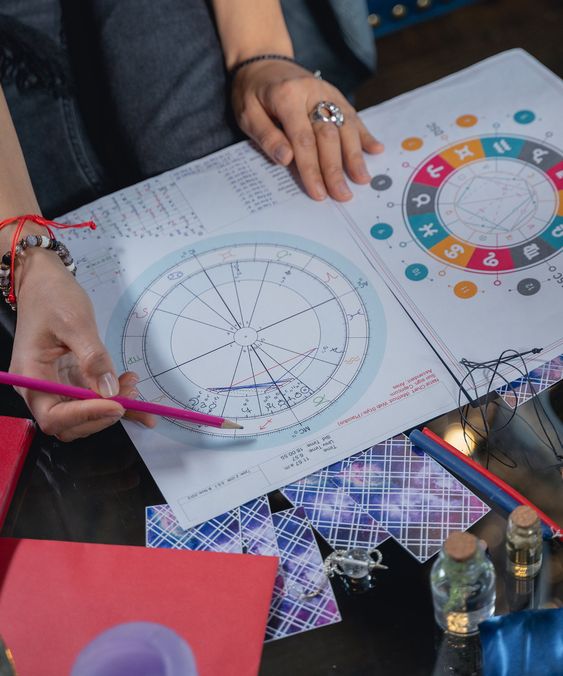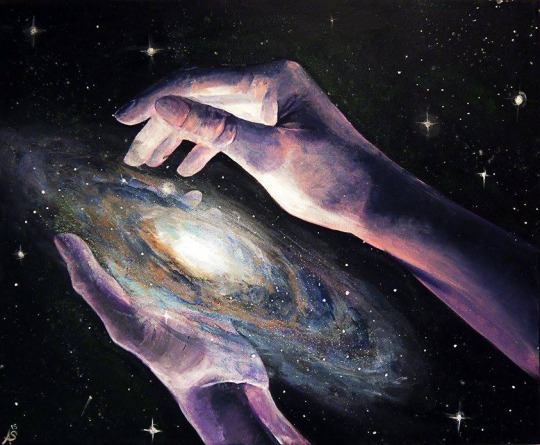
Astrology: The Algebra of life
 Looking up at the sky has always been an inherently human experience, one that fills us with a profound sense of wonder. It’s as if we can’t help but be spellbound by the vast expanse of space above, and the very forces that brought our universe into existence. In these moments, we find ourselves pondering not just the mysteries of the cosmos but also our own place within it. Astrology, the age-old practice of interpreting the positions and movements of the planets to gain insight into human affairs and natural phenomena, adds another layer of intrigue to our celestial musings. The word “astrology” itself is rooted in the Greek term “logos,” which translates to the “language of the stars.” This linguistic connection underscores the notion that the heavens above hold a message, a story, or perhaps even a divine narrative that is intertwined with our existence here on Earth.
Looking up at the sky has always been an inherently human experience, one that fills us with a profound sense of wonder. It’s as if we can’t help but be spellbound by the vast expanse of space above, and the very forces that brought our universe into existence. In these moments, we find ourselves pondering not just the mysteries of the cosmos but also our own place within it. Astrology, the age-old practice of interpreting the positions and movements of the planets to gain insight into human affairs and natural phenomena, adds another layer of intrigue to our celestial musings. The word “astrology” itself is rooted in the Greek term “logos,” which translates to the “language of the stars.” This linguistic connection underscores the notion that the heavens above hold a message, a story, or perhaps even a divine narrative that is intertwined with our existence here on Earth.
While astrology may seem mystical or esoteric, its foundations can be traced back to the brilliant minds of ancient philosophers like Aristotle and Pythagoras. Aristotle, often regarded as one of the most influential thinkers in the history of Western philosophy, was among the first to recognize the potential of mathematics as a tool for comprehending the starry heavens. He saw the inherent order and harmony in the movements of the planets, and he realized that mathematics could serve as a key to unlocking the secrets of the universe. Pythagoras, on the other hand, took mathematics to a level of profound beauty and significance. He believed that numbers were not just a means of organizing information but were, in fact, a fundamental element of the universe’s fabric. To Pythagoras, numbers held a deeper truth, one that transcended mere calculation and was intimately connected to the very essence of reality.
This deep reverence for the precision and beauty of mathematics is a fundamental aspect of astrology. Astrologers utilize the precise calculations of planetary positions and movements to draw conclusions about the influence of the cosmos on human life and events. In doing so, they echo the sentiments of Pythagoras, who believed that the basic reality of nature was rooted in numbers. When we contemplate astrology in this light, we can’t help but feel that we are all part of something far grander and more profound than our individual existence—a universal realm woven with the threads of mathematics and the language of the stars. It reminds us that, in our quest for understanding the universe and our place within it, we are continuing the legacy of those ancient philosophers who sought to decipher the secrets of the cosmos through the language of numbers and the wonder of the night sky.
In ancient times, the belief that God or a divine force had crafted the heavens and set them into perfect and eternal motion prevailed. This idea was deeply rooted in various cultures and religious beliefs, shaping the way people perceived the cosmos. In parallel, the intellectual landscape was heavily influenced by Greek philosophy, which sought to understand the fundamental principles governing the physical world. These philosophical ideas served as a backdrop to the development of astrology. Astrology, as a psychic art, is regarded by many as possessing profound depth, significance, and meaning. It’s seen as a unique tool that allows individuals to explore the complexities of their own lives and the world around them. For those who engage with astrology, it offers a lens through which to view the universe as a web of interconnected forces and energies, rather than a random and chaotic existence. It’s believed that by delving into astrology, one can gain valuable insights into themselves and gain a greater capacity to empathize with and understand the perspectives of others.
The roots of astrology extend far back into prehistoric times when people worshipped heavenly bodies and ascribed mystical powers to them. This association with myth and celestial bodies has been a constant throughout human history. Mythological stories often carry symbolic representations of human experiences, including emotions, conflicts, successes, anxieties, and more. These narratives provide a framework for understanding and interpreting the complexities of human life. Astrology acknowledges that, as humans, we share psychological structures, aspirations, and common experiences, despite our individual differences. Instead of diminishing our uniqueness, astrology allows us to appreciate the common threads that run through the human experience. By studying astrology, individuals can explore and work with archetypal themes that resonate with their own lives while recognizing that these themes are universal and shared by people from diverse backgrounds.
Astrologers themselves classify their profession in various ways, often aligning with their personal perspectives. Some see it as esoteric, delving into hidden or mystical aspects of the cosmos. Others view it through a spiritual lens, believing that it connects them to a higher spiritual understanding. Many astrologers emphasize the psychological aspects of astrology, using it as a tool for self-discovery and personal growth. There are also those who approach astrology as an empirical science, seeking to understand and predict human behavior and events through systematic observation and analysis. Regardless of the specific perspective one takes, astrology remains a captivating and enchanting world, filled with intrigue and mystery. It invites individuals to explore the cosmos and their own lives through a unique and multifaceted lens, encouraging a deeper connection with the universe and a greater understanding of the human experience.
The visionary known as the “sleeping prophet,” Edgar Cayce, is a figure in the realm of mysticism and metaphysics who left a lasting impact with his insights and prophecies. Among the concepts he explored were visions of planetary spheres serving as temporary abodes for souls between their incarnations on Earth, viewed through a deeply spiritual lens. In the realm of occult science and esoteric knowledge, references to the astral planes are common. These planes are often seen as levels of existence beyond the physical, where consciousness and spirit operate on a higher, more refined frequency. The idea that humanity is connected to the solar system suggests a profound interconnectedness between the cosmos and our existence. It implies that our lives are not random, but rather guided by a purpose and a blueprint set forth by a Creator or higher power.
Cayce’s perspective aligns with the belief that Earth serves as a gathering place for souls, a platform for individuals to collaborate and build upon the lessons and experiences accumulated in previous lifetimes. This concept suggests that the Earthly plane is a unique opportunity for spiritual growth and development. The notion of planetary vibrations, as elucidated by Cayce, draws analogies between the resonances that individuals gather, absorb, and build upon throughout their lifetimes. These vibrations are thought to be influenced by the positions and movements of the planets, connecting the spiritual journey of an individual with the movement of the planets.
According to Cayce’s readings, spiritual advancement requires traversing through all the planetary spheres and ascending to the spiritual plane. This journey represents a progression of the soul through various levels of consciousness and understanding, with each planetary sphere serving as a stepping stone toward higher spiritual awareness. It suggests that our lives on Earth are part of a grand spiritual evolution, with the ultimate goal being a return to a higher spiritual state.


















 The Twin Journeys of Saturn’s Returns
The Twin Journeys of Saturn’s Returns
 Pluto Transits Moon: A Time to Grieve
Pluto Transits Moon: A Time to Grieve
 Uranus Transits: 1st House: Winds of Change:
Uranus Transits: 1st House: Winds of Change:
 Venus-Pluto Synastry: A Love So Powerful That It Might Just Kill Them
Venus-Pluto Synastry: A Love So Powerful That It Might Just Kill Them
 Moon Conjunct Pluto Synastry
Moon Conjunct Pluto Synastry
 Love’s Mirage: The Sun- Neptune Synastry Influence
Love’s Mirage: The Sun- Neptune Synastry Influence
 Venus Opposite Uranus: Free to Love as You See Fit
Venus Opposite Uranus: Free to Love as You See Fit
 Sun Square Jupiter Natal Aspect
Sun Square Jupiter Natal Aspect
 Sun Square Uranus Natal Aspect
Sun Square Uranus Natal Aspect
 Saturn Conjunct Pluto Synastry
Saturn Conjunct Pluto Synastry
 Uranus Transits the 2nd House: Financial Freedom and Self-Expression
Uranus Transits the 2nd House: Financial Freedom and Self-Expression
 Pluto in the 4th House: You’ll Undergo a Personal Transformation at Home
Pluto in the 4th House: You’ll Undergo a Personal Transformation at Home
 Sun in the 12th House: From Isolation to Illumination
Sun in the 12th House: From Isolation to Illumination
 Dispositors in Astrology
Dispositors in Astrology
 Moon in the 9th House
Moon in the 9th House
 Sun Conjunct Mercury: Blindspots
Sun Conjunct Mercury: Blindspots
 Neptune Transits the Sun: A Period of Disorientation?
Neptune Transits the Sun: A Period of Disorientation?
 Venus Trine Pluto: Dark Desires
Venus Trine Pluto: Dark Desires
 Mercury Opposite Uranus Natal Aspect
Mercury Opposite Uranus Natal Aspect
 Moon Conjunct Uranus Natal Aspect
Moon Conjunct Uranus Natal Aspect